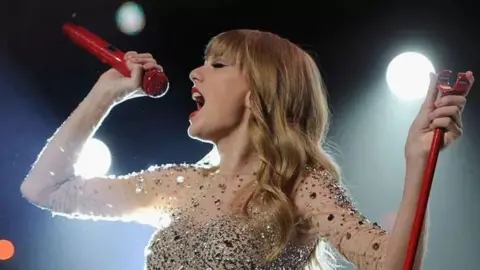 Getty Images
Getty ImagesThe UK competition regulator has launched an investigation into the sales of Oasis tickets, including the use of “dynamic pricing”.
The Competition and Markets Authority (CMA) is investigating whether ticket selling platform Ticketmaster breached consumer protection law.
Dynamic pricing meant that, on Ticketmaster, where tickets to the reunion tour were originally sold, prices rose in line with demand.
The investigation will examine whether:
- Ticketmaster engaged in unfair commercial practices
- Buyers were given clear information to explain that the tickets could be subject to price rices
- People were put under pressure to buy tickets within a short period of time
The CMA’s probe follows widespread criticism of dynamic pricing over the past week from Oasis fans.
Many said they ended up paying significantly more than they expected to for tickets to the band’s tour next year – up to £350 per ticket, around £200 more than had been advertised.
The band also hit out at the system, saying: “It needs to be made clear that Oasis leave decisions on ticketing and pricing entirely to their promoters and management.”
The independent CMA said it was at the “initial stage of its investigation”.
It said it would engage with Ticketmaster and gather “evidence from various other sources,” which could include the band’s management and event organisers.
The CMA said: “It should not be assumed that Ticketmaster has broken consumer protection law.
“The CMA will also consider whether it is appropriate to investigate the conduct of anyone else in relation to the matter.”
Ticketmaster, which claims to be the world’s biggest entertainment ticketing platform and is one of three official sellers for the Oasis shows, says it did not set ticket pricing policy – artists and promoters did.
But an investigation by the BBC’s Chi Chi Izundu and James Stuart found that the division was not as clear as Ticketmaster made it sound.
There are three promoters for the Oasis reunion tour, all with links to one company: Live Nation, the US multinational which owns Ticketmaster.
A letter from the CMA to Culture Secretary Lisa Nandy and Secretary of State for Business Jonathan Reynolds said that dynamic pricing was not unlawful.
But it added that the use of the practice must not mislead consumers and must be done in a transparent manner.
CMA chair Marcus Bokkerink and chief executive Sarah Cardell said: “We are keeping open all potential options for action.
“This includes potential enforcement action where we see evidence of possible breaches of consumer protection law.”
The CMA is also inviting fans to submit evidence of their experiences in relation to the sale of tickets for the Britpop band, such as screenshots of the ordering process.
 Getty Images
Getty ImagesIn January last year, Ticketmaster apologised to Taylor Swift and her fans during a US Senate hearing, months after its system was overwhelmed by demand for her ongoing Eras Tour.
Thousands of so-called “Swifties” were unable to buy seats.
“We need to do better and we will,” Live Nation president Joe Berchtold told lawmakers on Tuesday.
He claimed a bot attack was responsible for the “terrible consumer experience”.
The BBC’s Mark Savage wrote at the time that Ticketmaster, which merged with Live Nation in 2010, has repeatedly faced criticism from fans and politicians, who say it has too much control over the live music market and artificially inflates the cost of tickets with fees and service charges.
Ticketmaster, Live Nation and SJM have not responded to BBC requests for comment.


